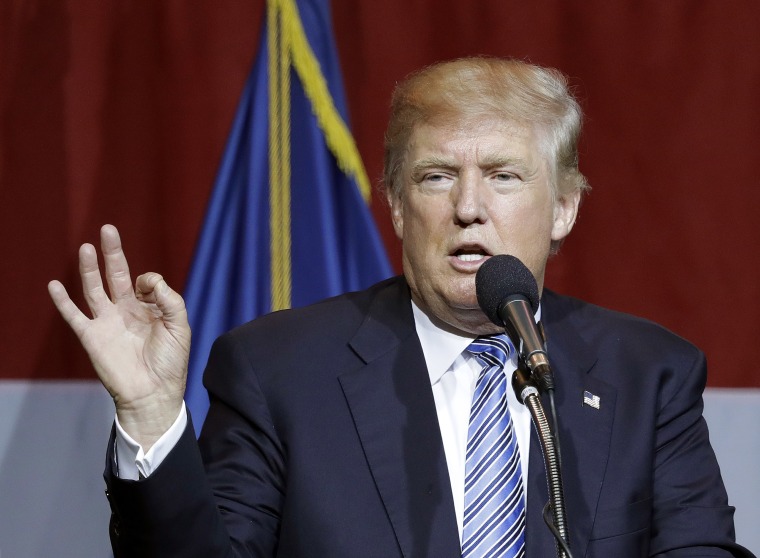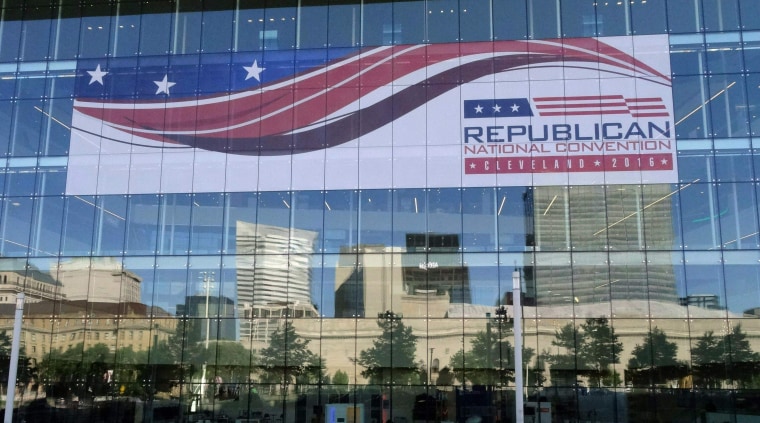CLEVELAND, Ohio — A city that defines the ups and downs of America's industrial history seems an unlikely location for the coronation of a presidential nominee as flashy and glitzy as Donald Trump.
The region is synonymous with phrases like "blue collar," "hard hats," "the dawg pound" and "rust belt." The candidate is best known for his private planes, gold-plated palaces, exclusive golf resorts and a lavish lifestyle of the rich and famous.
But this once-shining production jewel on the shore of Lake Erie and the man whose candidacy has been fueled by voters frustrated and left behind by economic globalization have more in common than meets the eye at first glance. And both are riding a wave.
City leaders say the northeast Ohio city is seeing resurgence after a tumultuous history marked by exuberant periods of wealth and depressed eras of blight.
In time to welcome thousands of Republicans to town, the city just invested nearly $20 million of a $50 million public-private partnership for a central component of the city’s facelift of the Public Square, a gathering place that had devolved into an unappealing massive intersection over decades of crumbling economy.
Now the square is a massive green gathering space in the center of downtown that is expected to be the central location for convention protests.
Cleveland, once one of the wealthiest cities in the country, became disparagingly known as the "Mistake on the Lake" during its extreme decline.
But at its height in the late 1800s and first part of the 20th century, it was one of the wealthiest places in the country. Euclid Avenue, in the heart of town, was known as "Millionaires' Row." It was home to John D. Rockefeller and was a breeding ground for national Republicans.
Eight presidents have come from Ohio — more than any state other than Virginia — and all have been Republican. The presidents from Ohio emerged during the years when Cleveland thrived — from 1841 until 1923.
Cleveland and its steel and iron manufacturing continued to flourish through the 1950s and 1960s, but in the 1970s Cleveland, along with manufacturing, began its decline. The entire country saw middle class wages start to stagnate in the mid-1970s and economic disparity grew. Because Cleveland's industry was so focused on manufacturing, the city suffered even more.
Trump, a nontraditional Republican whose central campaign theme is railing against free trade, will descend on the area that made and lost its wealth because of industrialization and trade.
"Cleveland has in many ways represented both the upswings and the downswings of the industrial economy in this country’s history," said Jeremy Paris, executive director of the Group Plan Commission, tasked with building Public Square.
Related: In Hard-Hit Ohio Town, Trump Resonates
While shuttered steel plants still dot the skyline and dormant factories with rusted out buildings sit on wastelands, new businesses and the tech sector are emerging. And just last month, the Cavaliers won their first NBA championship in franchise history — giving "Believeland" its first major sports title in more than 50 years.
Just a decade ago, according to the Cleveland Host Committee, 20,000 properties stood vacant. That number is down to 6,000, signifying an effort to revitalize the town.
Many workers who still have their manufacturing jobs are nervous, scared and angry, however.
"There's going to be a lot more offshoring of jobs and that's going to affect us directly," said Brian Sealy, a union official for the United Steelworkers in Lorain, a town 30 miles outside of Cleveland.

Enter Trump: A man who exudes — and boasts about — wealth. He has spent much of his career building a name brand associated with success, reflecting the traditional aspirations of the American middle class. And he will formally claim the Republican presidential nomination here this week.
Trump has also perfected the art of populist anger, talking a language that squeezed workers feel and understand.
On the campaign trail, he calls the North American Free Trade Act "the worst trade deal in history." He consistently says such agreements have led to the drain of jobs to foreign nations like Mexico and China, going so far as to say the nation's trade policy with China is akin to economic "rape." And he promises to tear up trade agreements and renegotiate the terms.
Related: The United States of Trump
While Trump promises to bring lost jobs back to the U.S., Cleveland has been working to correct the downward spiral — but not by reigniting old industries. Instead, the city, like others around the country, has invested in the health care industry and worked to reinvigorate its downtown with new restaurants and start-up businesses.
David Gilbert, CEO of the Cleveland Host Committee, is someone who has devoted his working life to making Cleveland great again. He is also head of the group charged with fundraising for the convention and ensuring Republicans and members of the media visiting Cleveland see a prosperous and dynamic city.
"Cleveland’s really undergone a tremendous resurgence and we really felt that this was a great time for us to be seen," Gilbert said. Whether this city and the vital state of Ohio can help Trump surge to the White House will be revealed in November.

